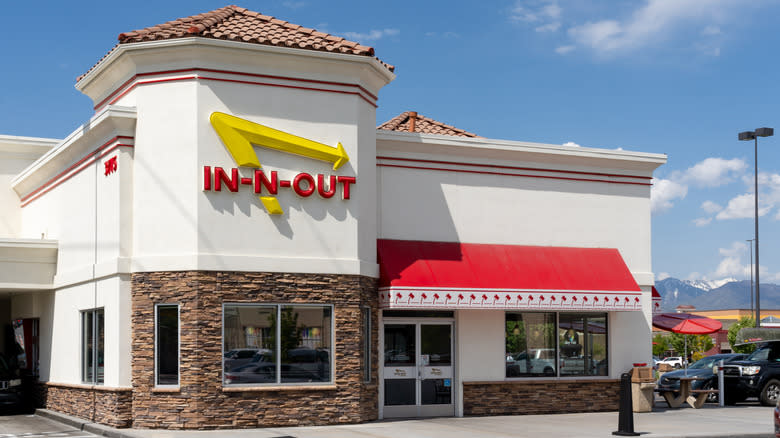You might not initially associate fast food with religion, but the two are actually a surprisingly common pair — and not just because the fries from your favorite joint evoke a spiritual experience. Three restaurants, in particular, have roots planted deep inside the Christian culture, and even though the menus look very different from the foods that Jesus likely ate, the religious connection can be seen through the way these businesses operate. We’re talking about Chick-fil-A, In-N-Out, and Carl’s Jr. (which is run by the same company that owns Hardee’s).
All three restaurants were founded by deeply faithful people whose beliefs strongly influenced their business. Some of the practices they implemented still stand to this day, allowing customers a glimpse into the spiritual values of the company. All of these have also kept the business in the family throughout the years, as the members of the original founding families are still involved in the running of all three chains. Let’s take a closer look at how the most religious fast food restaurants came about and how they’ve managed to intertwine burgers with Christianity.
Read more: 15 Fast Food Chicken Wings, Ranked Worst To Best
Chick-fil-A

Chick-fil-A brick storefront with American flag – Susan Vineyard/Getty Images
Chick-fil-A has locations in nearly every single U.S. state, and all of them close the doors on Sundays in what is, perhaps, the most transparent way to clue customers in to the chain’s religious background. The “closed on Sundays” practice was started by the founder of Chick-fil-A, S. Truett Cathy. He wanted to honor the Sabbath, the holy day of rest, and encourage the employees to attend Sunday Church — even if it meant cutting into the weekend profits.
Advertisement
Advertisement
Cathy started the business in 1946 and was known for his zealous Christian beliefs that trickled into every aspect of the way Chick-fil-A was run. Under his reign, the path to employment at the restaurant was long and full of detailed personal questions, which some found intrusive. Although he didn’t require his employees to be Christian, he did tell Forbes in 2007 that the workforce was expected to act in alignment with biblical principles. Over the years, the chain has seen many public controversies, particularly in regard to those principles, but the hot waters eventually calmed down when the restaurant refocused its public messaging.
Chick-fil-A is now owned by Cathy’s grandson and continues to be open about its spiritual beliefs. The headquarters are clad in Christian symbolism and even feature a statue of Jesus. The chain’s mission, posted on the official website, states that the main purpose of the business is “to glorify God by being a faithful steward of all that is entrusted to us.”
In-N-Out

In-N-Out storefront with a red awning – Jhvephoto/Getty Images
If you’ve ever been to In-N-Out, one of the fast food restaurants known for serving fresh, not frozen food, you might have noticed that the packaging came with a Bible verse subtly printed at the bottom. Well, not the whole verse, per se; just the location of the verse in the Bible. The idea came from Richard Snyder, son of the original founders of the chain, Harry and Esther. He had the verses printed on drink cups and burger wrappers, likely as a way to encourage the customers to look them up.
Although raised with a Catholic and Methodist background through his parents, Richard converted to evangelism, which influenced his approach to In-N-Out. The Bible verses were the first — a fairly discreet way to proclaim his faith — but on Christmas Eve in 1987, he made a much bolder statement: The regular In-N-Out radio ad promoting the chain’s hamburgers was changed to promote salvation instead.
Advertisement
Advertisement
Many years later, Richard’s niece, Lynsi, took over the fast food chain. As a Christian herself, she wanted to pay homage to her uncle and to her faith with the way she runs In-N-Out. She decided to expand the lineup of the verses, and they now feature on the fry boat and the hot drink cups as well.
Carl’s Jr.

Modern gray-and-red Carl’s Jr. storefront – Maksim Safaniuk/Getty Images
Carl’s Jr. was founded by a married Catholic couple, Carl and Margaret Karcher. It all began with $326 and a hot dog stand, eventually growing into a massive business, known today as CKE Restaurants, which owns both the Carl’s Jr. and Hardee’s restaurants. The faith of the Karcher family was the absolute centerpiece of their life, but in contrast to Chick-fil-A and In-N-Out, it didn’t really trickle into the restaurant’s public branding or messaging. Carl largely lived out his faith individually — attending early morning mass, passing around Bible verses with coupons to his restaurants, and building a big family (the couple had 12 children). He was widely recognized in the Catholic community, though, and even received the Pope John XXIII Award from the Italian Catholic Federation.
That said, Carl was known to stir the pot with his social and political beliefs, rubbing shoulders with controversial politicians of the time. This caused more than a few controversies during his tenure and inevitably turned some potential customers away. In 1993, Carl was unexpectedly removed as chairman of the company in a dispute over marketing strategies. Right after the event took place, he went to the only place that could comfort him — the Church.
Read the original article on Tasting Table.
发表回复